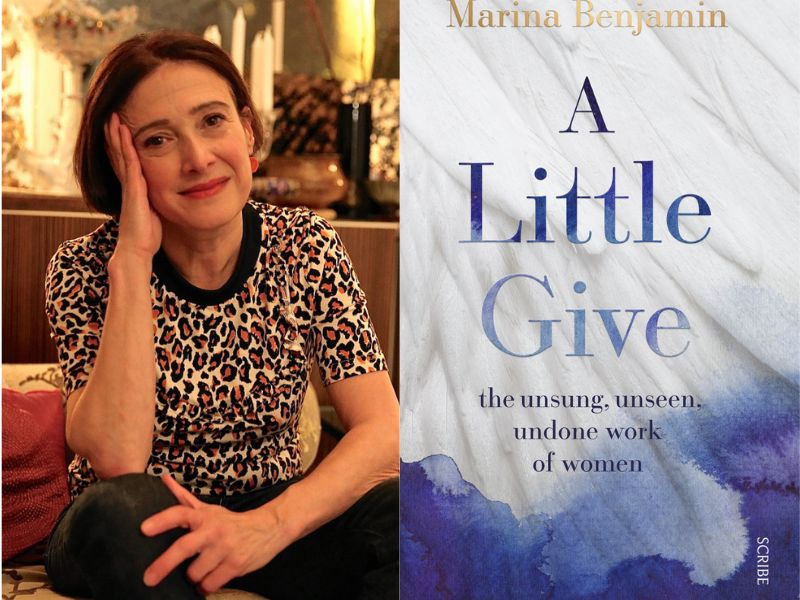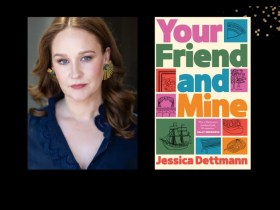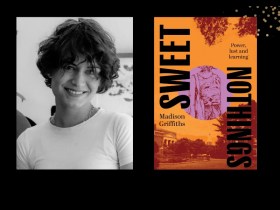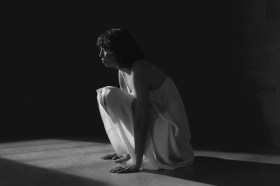Marina Benjamin is an eloquent writer of more than five books as well as essays on a wide range of topics. A Little Give, her most recent book, is a collection of essays, memoir, poetry and philosophy, interspersed with inspiration from authors including Natalia Ginzburg, Maria Tumarkin and Virginia Woolf.
As a piece of literature, it’s energetic and thought-provoking, moving swiftly from philosophical thoughts on what it means to be a woman, to a deep dive into enduring memories from her childhood, to touching reflections on her life, broken into chapters with titles such as ‘Cleaning’, ‘Pleasing’, ‘Feeding’ and ‘Lapsing’. As a book that claims to explore the ‘unsung, unseen, undone work of women’, it’s introspective and personal rather than broad and universal.
Benjamin’s personal experiences, parental expectations and the cultural norms she imbibed in her youth will not necessarily be reflected in the lives of every reader. This is not to diminish the quality of the writing and the raw honesty with which Benjamin writes.
The stories within A Little Give largely focus on domesticity, the role of women in the home and in relation to immediate family members, and issues and challenges facing the ‘sandwich generation’: women who care for both elderly relatives and their own children. The book explores Benjamin’s experiences and challenges as she cares and cleans for her parents, her elderly aunt, people in her community, her dog and her teenage daughter. She is pulled in different directions by the programming to please, clean, feed and safeguard versus the desire to be her own self.
In the chapter ‘Pleasing’, she says, ‘I had been programmed well. My childhood home was a factory of femininity. A site of cultural reproduction. It had been drummed into my core that women were put on this planet to please. As my mother so well exemplified they should support their menfolk, push them forward and have their backs, swallowing their own anger and aspirations in order to be the glue that bonds families together.’
Benjamin grapples with how to claim her space, while still being expected to fill traditional female roles. She says, ‘With feminism in my corner I could remake myself against type, practise a radical form of artistry, sculpt myself using bold new lines.’
She is inspired by other writers, but by and large we read her thoughts inspired by their writings, rather than the words of the writers themselves. There seems to be an assumption of knowledge and an expectation that readers will have read these authors and understand Benjamin’s references.
Where A Little Give hits its stride is in the detailed, poignant memories from Benjamin’s childhood, especially stories about her father. For a book focusing on women’s work, her father, a migrant tailor and fashion designer in 1960s and 1970s London, is the second most prominent character. He is fascinating, working in high fashion but not quite fitting in, patriarchal and obsessed with women’s beauty, raising his daughter to be ‘fit to be seen’. Benjamin also shares stories of the life of her mother and her Aunt Marta, but the energy surrounding them and their lives sparkles less in comparison to pages given to Benjamin’s father.
The book starts with Benjamin and her mother cleaning her Aunt Marta’s house, which is filled with ammonia from stale urine. Her aunt, she realises, is incontinent. This is a startling and confronting way to start a book on the unsung work of women, but it’s also fitting. The stuff of bodies – feeding, cleaning, caring, grooming – takes up more than two-thirds of the book.
In ‘Feeding’, she writes about joining a soup kitchen during COVID lockdowns in London, and these passages are some of the most powerful and interesting, partially because they involve people outside Benjamin’s immediate family. The book would have been stronger with more stories about the broader society and culture that Benjamin inhabits, shining a wider light on other ways in which women are unseen, unsung and undone.
Benjamin acknowledges that she occupies a certain space in society. She says, ‘I could set the tone here. Be declarative. Tell you that as a heterosexual, cis woman who mostly passes for white I profit from a suite of unquestioned norms – though when I position myself outside the chalk circle I’m able to better see how white advantage desensitises us to other oppressions.’ However, she doesn’t dive deeper into what this means and what life may be like for women beyond her immediate world.
As the child of migrant parents, Benjamin’s childhood, womanhood and now middle age years are all impacted by the culture and religion she says was ‘seemingly imported from medieval Iraq’. She rails against their ‘clannish conservatism, their concern with face and their attachment to shame’. For insight into the experiences of second-generation women and the influence of parental culture and religion, A Little Give is powerful and well worth the read.
Read: Theatre review: Made in China 2.0, Malthouse
It is raw and honest in parts and some of the passages are elegiac and beautiful. However, the book would have benefited from a broader perspective, possibly with stories from other cultures or analysis of current and emerging trends, as well as research or stories beyond the shores of England.
A Little Give: the unsung, unseen, undone work of women by Marina Benjamin
Publisher: Scribe
ISBN: 9781922585660
Format: Paperback
Pages: 256pp
Publication date: 31 January 2023
RRP: $29.99





